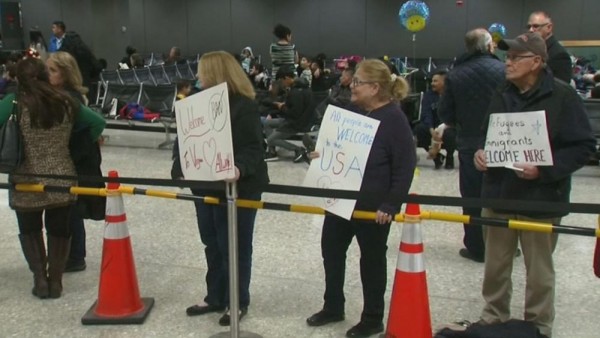Travel-data specialist ForwardKeys said bookings for international arrivals to the US over the next three months were 2.3 percent higher than at this time last year. But on the the day that Trump issued the ban they had been up by 3.4 percent.
When the travel ban was in place from January 28 to February 4, bookings to the United States dropped 6.5 percent, including an 80 percent slump in reservations from the seven countries listed on Trump’s order and a 13.6 percent drop from Western Europe.
ForwardKeys CEO Olivier Jager said: “The data forces a compelling conclusion that Donald Trump’s travel ban immediately caused a significant drop in bookings to the USA and an immediate impact on future travel. This is not good news for the US economy.”
Travel to the USA suffers 6.5% Trump slump https://t.co/p3DkhQDwfh pic.twitter.com/86K8BvzYqj
— ForwardKeys (@ForwardKeys) 8 febbraio 2017
ForwardKeys got the information from analysing 16 million flight reservations a day.
The US is the second most visited country – after France – and this comes at a time of booming travel according to Sébastien Bazin, chief executive of AccorHotels. He told Euronews: “You have a 1.4 billion people travelling every year and it is increasing five percent per year. Why? – because the cost of travel today is a third less expensive than the same travel 10 years ago. Why? – access to low-cost airlines, more competition in the hospitality sector, because of Airbnb, Booking.com, because of being able to compare prices.”
Snapshot
ForwardKeys cautioned that the information was just a snapshot of the eight-day period when the ban was in force, but added it will continue to monitor the situation.
Donald Trump’s Ban on Travel and Its Impact on The Airline Segment https://t.co/2v0IXWQMSP #mrx #podcast
— Euromonitor (@Euromonitor) 7 febbraio 2017
Other groups, such as the UN’s World Tourism Organisation, have also warned travel bans could damage the US tourist industry.
UNWTO’s head Taleb Rifai said travel bans based on nationality are “contrary to the principles of freedom of travel”.
He added: “Global challenges demand global solutions and the security challenges that we face today should not prompt us to build new walls; on the contrary, isolationism and blind discriminatory actions will not lead to increased security but rather to growing tensions and threats.”
Impact on perception
“The ambiguity of these very latest developments introduced by President Trump is casting a shadow over future travel demand to and from the US,” said Nadejda Popova, travel project manager at market research firm Euromonitor International.
“The new executive order could also impact how the US is perceived as a tourism destination and how open to foreign travelers it will be in the future.”
With the world now getting more isolationist it's time for Asean to start making it easier for tourists tocome.need an electronic Asean visa
— Tony Fernandes (@tonyfernandes) 31 gennaio 2017
The numbers
Bookings for travel for the US were down:
- 6.6 percent from Northern Europe
- 13.6 percent from Western Europe
- 2.9 percent from Southern Europe
- 37.5 percent from the Middle East
- 14 percent from Asia-Pacific
Bookings were up:
- 15.8 percent from Central/Eastern Europe
- 2.3 percent from The Americas
Other countries look to benefit
Companies and officials in Asia said they would target greater tourism and education ties with Muslims worried about the US curbs.
In Muslim-majority Malaysia, the group CEO of Asia’s largest budget airline, AirAsia, suggested countries in the 10-member Association of Southeast Asian Nations (ASEAN) could cash in.
“With the world now getting more isolationist it’s time for ASEAN to start making it easier for tourists to come,” Tony Fernandes said in a tweet.
In Thailand, tourism officials said the US ban could lift visitor numbers.
“The Middle East is a big market for us, especially in the medical tourism sector. They may choose to visit Thailand more and this may also boost our sector,” Tourism Authority of Thailand Governor Yuthasak Supasorn said.
Reconsidering
With concerns about safety and security building, some Asians were reconsidering US travel plans and seeking alternatives, even though their countries were not subject to the restrictions.
“When you want to travel, especially for leisure, then you want peace of mind,” said Alicia Seah, director of public relations and communications at Singapore’s Dynasty Travel.
S.M. Tareque, managing director of Orchid, a travel agency in the Bangladeshi capital Dhaka, said he had canceled his own trip fearing harassment at US airports.
He said he knew of five people who were emigrating to the United States who had put their plans on hold. (Euronews)

